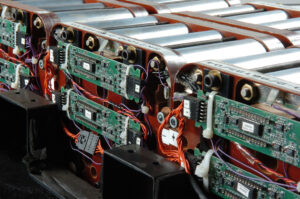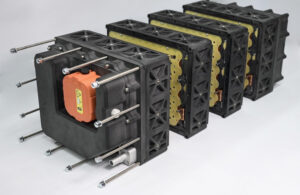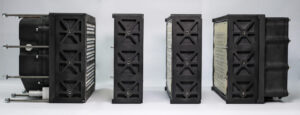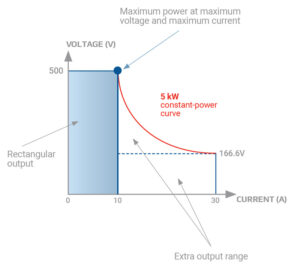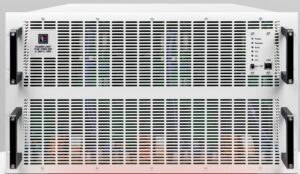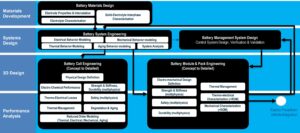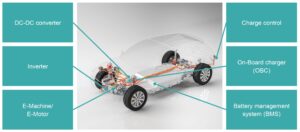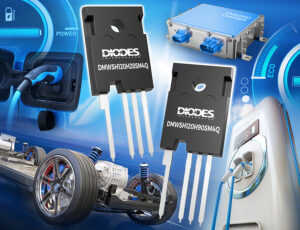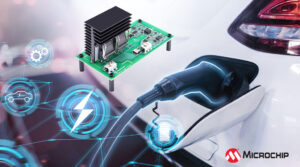Researchers at Chung-Ang University used high-concentration electrolytes to improve safety and prevent cell swelling caused by lithium plating. To achieve a greater adaption of electric vehicles, the automotive industry needs fast-charging batteries that don’t compromise energy density. Lithium plating for ultra-fast charging raises safety concerns due to high cell polarization, requiring careful attention. During fast…
Battery pack keeps its cool
XING Mobility has announced the official release of its IMMERSIO Cell-to-Pack (CTP) product at the IAA Mobility show in Munich, Germany. This innovative battery pack, which features high energy density and exceptional heat dissipation and safety features, will be presented for the first time to the global audience at the event. XING’s IMMERSIO CTP Solution…
SMT isolation transfers measure just 7.2 x. 485 mm
XING Mobility has announced the official release of its IMMERSIOTM Cell-to-Pack (CTP) product at the IAA Mobility show in Munich, Germany. This innovative battery pack, which features high energy density and exceptional heat dissipation and safety features, will be presented for the first time to the global audience at the event. XING’s IMMERSIO CTP Solution…
Testing batteries for an evolving world
Battery testing enables vehicle manufacturers, owners, and researchers to make informed decisions, optimize vehicle performance, and enhance overall user experience. Demand for electric vehicles is amping up. Every one of these vehicles needs large batteries, and the industry is responding by building plants. Energy.gov forecasts that by 2030 electric vehicle battery manufacturing capacity in North…
EV battery tests involve lots of power
In a video, EE World spoke with a power-supply applications engineer about why RV batteries use such high voltages and how to test them. Batteries are perhaps the most expensive component of an electric vehicle. Typically producing 800 V to 900 V, batteries deliver the power needed move the vehicle. Of course, EV batteries need…
How does MBSE work for EV and stationary battery energy storage systems?
Model-based systems engineering (MBSE) is comprehensive. The International Council on Systems Engineering (INCOSE) defines MBSE as the “formalized application of modeling to support system requirements, design, analysis, verification, and validation activities beginning in the conceptual design phase and continuing throughout development and later life cycle phases.” It’s especially applicable to complex systems of systems like…
How is functional safety defined & implemented for batteries in EVs and BESS?
Li-ion batteries can store large amounts of energy, and they can support high rates of power delivery. They are the preferred energy storage technology for EVs and large battery energy storage systems (BESS). But if not properly managed, they can also present safety hazards. That makes functional safety a critical consideration when designing large Li-ion…
Automotive-compliant SiC MOSFETs boost subsystems efficiency
Diodes Incorporated announced a further enhancement of its wide-bandgap product offering with the release of the DMWSH120H90SM4Q and DMWSH120H28SM4Q automotive-compliant Silicon Carbide (SiC) MOSFETs. These N-channel MOSFETs respond to the increasing market demand for SiC solutions that enable better efficiency and higher power density in electric and hybrid-electric vehicle (EV/HEV) automotive subsystems like battery chargers,…
ABB helps iconic Maid of the Mist boats go green
Anyone who’s visited Niagara Falls in the summer has surely watched the famed Maid of the Mist boats ply the waters of the Niagara Gorge. The ships, which appear tiny from above, seem to get perilously close to the thundering water from both the American and Canadian falls, crashing down roughly 200 feet. Now, the…
SiC-enabled demo board available in six variant for 400 – 800 V battery systems
To provide BEV and HEV designers with a faster and more reliable high-voltage circuit protection solution, Microchip Technology announces the E-Fuse Demonstrator Board, enabled by silicon carbide (SiC) technology, available in six variants for 400–800V battery systems and with a current rating up to 30 amps. The E-Fuse demonstrator can detect and interrupt fault currents in microseconds,…

